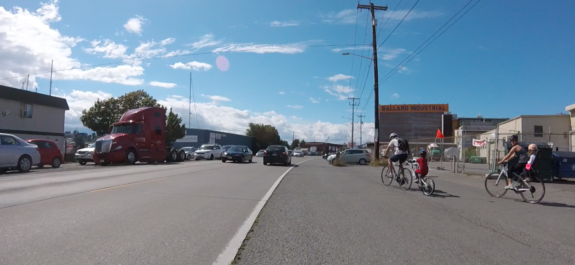WA Court of Appeals hears arguments in Missing Link case
The legal fight between the City of Seattle and the coalition of Ballard businesses fighting the completion of the Burke Gilman trail's Missing Link on Shilshole Ave NW moved ahead Friday morning as oral arguments were heard in the Washington Division I Court of Appeals. This marks the latest legal step in a process that has been going on for over eleven years as the legal grounds that the Ballard Coalition" are able to contest the validity of the City of Seattle's process to construct the 1.4 mile missing segment become narrower and narrower.

WIthout the Missing Link, people biking on Shilshole continue to face dangerous conditions.
Matthew Cohen, the lawyer representing the Cascade Bicycle Club in the litigation on the side of the City, told me after the hearing that he was hopeful" that a ruling would be in their favor and that the City and Cascade have the better of the arguments".
There are a lot of different issues that both parties are asking the appeals court to deal with in this case. The argument Friday primarily revolved around two of them. Perhaps the biggest one is a new issue that the City has raised in this appeal: that the Missing Link should never have been subject to SEPA review at all.
While still contending that the FEIS adequately analyzed and disclosed the Project's potential significant impacts", the city cites the fact that in 2015, the City Council modified the city's SEPA code to exempt all addition of bicycle lanes, paths and facilities, and pedestrian walks and paths including sidewalk extensions", including those to be constructed on private property. Previous designs for the Missing Link did include private easements, but the current design does not.
The Ballard coalition contends it is far too late" to introduce this line of argument, a fact that Judge Stephen Dwyer, one of the judges hearing the appeal, pushed back on quite a bit, suggesting that retroactivity" wasn't even relevant in the case. If the project becomes exempt at any time during the process then that's all that is relevant. But he also suggested the City had engaged in subterfuge" by not bringing forward an argument that it was exempt under SEPA even as it moved forward with a full EIS. You want us to take the hit for the city's dirty deeds", he said, suggesting that if the project was truly exempt then his hands would be tied.
The other major issue in the case is whether there has been a violation of the appearance of fairness doctrine" when Seattle's deputy Hearing Examiner at the time, Ryan Vancil, ruled against the Ballard Coalition in upholding the EIS while he was applying for the job of Hearing Examiner, which requires city council approval. Councilmember Rob Johnson participated in his job interview, and the Coalition notes he was a well-known bicycle advocate". (Many well known bicycle advocates" don't necessarily support the current proposed design for the Missing Link.) The Superior Court declined to take up this claim, noting that setting that precedent would impose a presumption that would taint virtually all decision making by [the hearing examiner]".
The Ballard Coalition also contends the City is in violation of a court order to not proceed with constructing any portion of the trail by constructing a portion on Market Street, but the City contends that the Market Street Multimodal improvements project, which rebuilt the street to include what will become the trail, has independent utility", which is certainly true.
There are other issues raised in the appeal on either side, and as we have seen in the past, a ruling against the City on any one of them would be enough to add additional years of delay to the project. The Ballard Coalition's brief tells the court this matter should be remanded to SDOT to prepare a new EIS, or in the alternative, remanded to the City for a new evidentiary hearing before a new Examiner", which presumably would add years and set up the potential for further appeal.
For now, we wait for a ruling from the court of appeals, which has no deadline to be issued; the earliest we might expect it is probably late Spring. In the meantime, the public health hazard that is the current Missing Link continues. SDOT maintains a commitment to build the trail, but says they do not anticipate starting construction earlier than 2022.
An Abbreviated Timeline of Missing Link Litigation
2008: SDOT issued first SEPA Determination of Non-significance (DNS), Ballard coalition appeals.
2011: SDOT issued a revised DNS, also appealed.
2012: SDOT issued a third revised DNS, appealed. Seattle Hearing Examiner orders a full Environmental Impact Statement (EIS)
2017: SDOT issues full EIS, Ballard coalition appeals it.
2018: Seattle Hearing Examiner rules EIS adequate; Ballard Coalition appeals ruling to King County Superior Court, which rules that the EIS is almost entirely adequate but does not fully account for certain economic impacts.
2019: Both the Ballard Coalition and the City file an appeal in the Washington Court of Appeals. The City issues an addendum to the EIS which includes the requested economic analysis even as the City appeals that ruling.